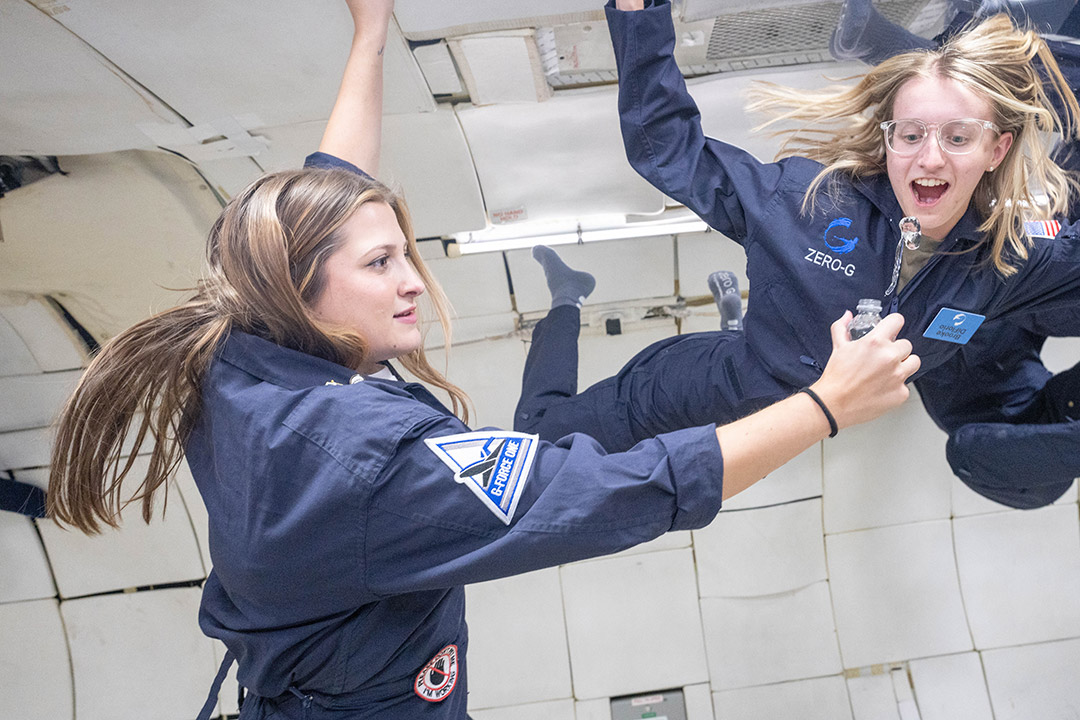Mechanical engineer combines leadership experiences and cybersecurity skills for new career

Provided
Brooke DiFlorio, right, tests zero gravity during a Space Force training program at the Air Force Academy last summer. She will bring skills in mechanical engineering and cybersecurity to the new service organization after graduating from RIT.
Brooke DiFlorio will launch her career as one of the first RIT Air Force ROTC cadets to be commissioned for the U.S. Space Force, the newest branch of the armed services.
“I knew I wanted to be in the military and be an engineer. Space Force was a way to combine both,” said DiFlorio.
It also provides the mechanical engineer in RIT’s Kate Gleason College of Engineering with an opportunity to apply some of the newest technologies she’s learning to keep America safe.
“I was drawn to the Space Force because of its newness and the opportunity it offered to be part of something historic,” she said. “I was excited by the idea of helping shape the foundation of a growing service and being one of the guardians who would help pave the way for future generations.”
Candidates apply for the Space Force by their second year of ROTC programming and proceed with recommendations from their detachment’s commanding officer. Cadets take a series of military science courses, and DiFlorio combined those with coursework in astronomy and mechanical engineering topics such as orbital mechanics.
DiFlorio served in several leadership positions including her current role as training squadron commander. She oversees execution of training related to cadre drills, coordinates Leadership Laboratories, plans Honor Guard events, executes Reveille and Retreat observances every Friday during the semester, and provides extra training for newer cadets.
These responsibilities position cadets to qualify for Space Force training activities. Only a few cadets are picked each year, and all are required to go through extensive field training at Maxwell AFB in Montgomery, Ala.
“It was an intense two-and-a-half-week experience that pushed us to our physical and mental limits,” said DiFlorio of her field training experience. “I had to quickly build trust and rely on fellow cadets whom I had just met upon arrival. We became each other’s support systems, working together to overcome the grueling Alabama heat and navigate high-pressure, stressful situations.”
Space Force expands on the Air Force’s intelligence gathering capabilities toward more worldwide defensive procedures specific to cybersecurity, including satellite tracking and sensing.
“We need to know how ‘space’ works, because space is a different domain. How can we defend ourselves in the future? Defense and deterrence—these are important,” said DiFlorio, who is from Chittenango, N.Y.
DiFlorio will also be following in her grandfather’s footsteps. He also served in the Air Force, and although she never had the chance to meet him, the stories her mother shared about him inspired her. DiFlorio will participate in this year’s graduation ceremony and complete a final training course over the summer. Once commissioned, she’ll report to Peterson Space Force Base in Colorado to attend the Officer Training Course, a yearlong technical program to further refine skills in space operations, intelligence, and cyberspace.
“I feel a deep desire to give back to the country that has given me so much. AFROTC has allowed me to experience college life while simultaneously preparing me to become a leader of character in the Space Force,” she said.
“Upon graduation, I’ll be stepping fully into the military world—and I’m genuinely excited for the challenges and responsibilities that lie ahead.”









